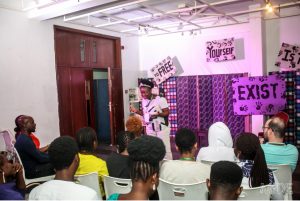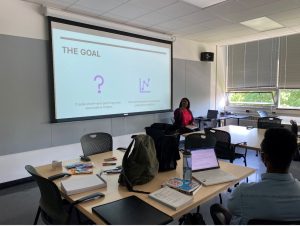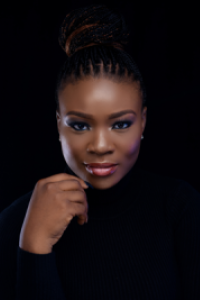Toyosi Tejumade-Morgan (Theatre) is a member of the 22–23 graduate cohort for “Imagining Otherwise: Speculation in the Americas,” the inaugural Interseminars initiative funded by the Mellon Foundation. She shares about her experiences with Interseminars below.
How has your understanding of “speculative practice” evolved over the course of this fellowship so far?
As a staunch realist obsessed with achieving efficacy in social justice theatre, my perspective of theatre activism has evolved from a compulsive desire to provide tangible outcomes that require longevity and time, to exploring social realities for the purpose of reframing and providing alternatives for changing the status quo.
“Speculative practice resonates with the common saying of what it is to ‘look’ at the whole picture, and not from a myopic view. I discovered that radical utopianism could conjure things to life, and I started to lean into it imagining ways to solve the issues.” — Toyosi Tejumade-Morgan
A typical example is how I started my current research into revolutionary protests. I discovered death often is the cause— the death of George Floyd, the death of Mahsa Amini. Now, I am beginning to speculate a world where injustice and tragedies can be prevented. How do we resist turning eyes from minor casualties of violence and abuse of power, and not waiting till someone dies before entering the streets? These approaches to speculation reshape and remap the trends in current issues, providing the pedagogy of resistance to achieve logical change. Like Karl Marx roars, the goal is not only to interpret history, but to change it.

How will you bring interdisciplinary collaboration into the next phase of your graduate school experience?
There is a saying in my native dialect that “what one is searching for is usually in one’s pocket all along.” My initial understanding of interdisciplinary collaboration is that it bridges the gap between disciplines and promotes multidisciplinary qualifications, but the Interseminars course texts and my readings unveiled a depth beyond the connotative meaning of the word. Interdisciplinary is the neoliberal concept of social justice activism, research-creation and auto-ethnography in the humanities. While I’m aware of the power digital media wields when projecting the experiences of injustice, prejudice, and stereotypes, I have come to understand that interdisciplinarity is more than just combining art and technology, it is a dominant part of critical theory that breaks hegemonic systems and deconstructs conventions, producing new and original works that synthesize theory and practices (Augsburg Tanya 2017, William Condee 2016, and Natalie Loveless 2019). The Interseminars professors invited Deke Weaver, an interdisciplinary artist and professor to the class, and his immersive lecture is more living proof of interdisciplinary collaboration as a solving mechanism, as his work nourishes the ecosystems and addresses climate change.

Therefore, my aim is to approach interdisciplinary study as a fluid form of conducting artistic and scholarly research, with the sole purpose of discovering new knowledge and modes of conceptualization to collate and interrogate data for communal participatory events in social injustice related issues. I would also like to reach out to field experts in public offices and law enforcement offices to reimagine the other possible outcomes to systemic racial violence, injustice, and massive protests.
